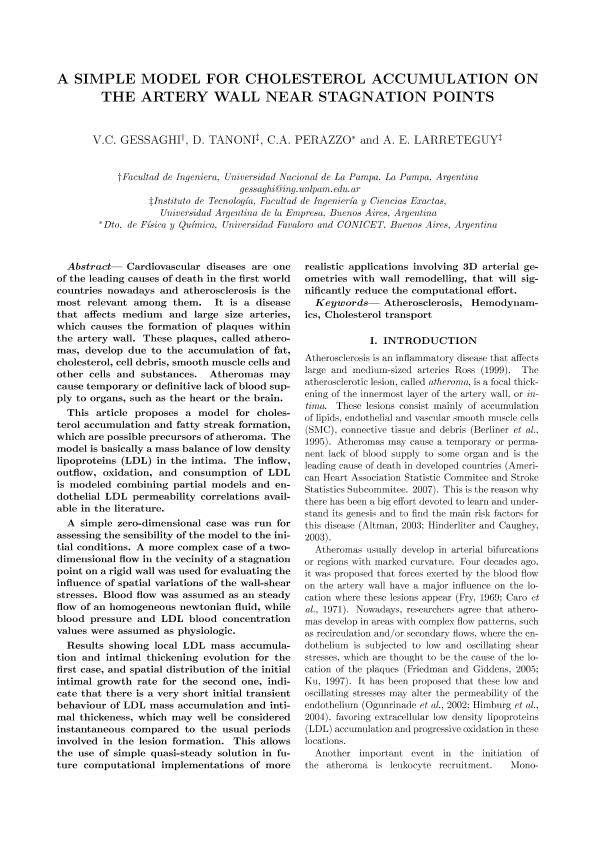Mostrar el registro sencillo del ítem
dc.contributor.author
Gessaghi, Valeria Cristina

dc.contributor.author
Tanoni, Debora
dc.contributor.author
Perazzo, Carlos Alberto

dc.contributor.author
Larreteguy, Axel Eduardo

dc.date.available
2023-04-26T16:05:03Z
dc.date.issued
2012-04
dc.identifier.citation
Gessaghi, Valeria Cristina; Tanoni, Debora; Perazzo, Carlos Alberto; Larreteguy, Axel Eduardo; A simple model for cholesterol accumulation on the artery wall near stagnation points; Planta Piloto de Ingeniería Química; Latin American Applied Research; 42; 4-2012; 1-9
dc.identifier.issn
0327-0793
dc.identifier.uri
http://hdl.handle.net/11336/195454
dc.description.abstract
Cardiovascular diseases are one of the leading causes of death in the first world countries nowadays and atherosclerosis is the most relevant among them. It is a disease that affects medium and large size arteries, which causes the formation of plaques within the artery wall. These plaques, called athero- mas, develop due to the accumulation of fat, cholesterol, cell debris, smooth muscle cells and other cells and substances. Atheromas may cause temporary or definitive lack of blood sup ply to organs, such as the heart or the brain. This article proposes a model for choles terol accumulation and fatty streak formation, which are possible precursors of atheroma. The model is basically a mass balance of low density lipoproteins (LDL) in the intima. The inflow, outflow, oxidation, and consumption of LDL is modeled combining partial models and en dothelial LDL permeability correlations avail able in the literature. A simple zero-dimensional case was run for assessing the sensibility of the model to the ini- tial conditions. A more complex case of a two- dimensional flow in the vecinity of a stagnation point on a rigid wall was used for evaluating the influence of spatial variations of the wall-shear stresses. Blood ow was assumed as an steady flow of an homogeneous newtonian fluid, while blood pressure and LDL blood concentration values were assumed as physiologic. Results showing local LDL mass accumula- tion and intimal thickening evolution for the first case, and spatial distribution of the initial intimal growth rate for the second one, indicate that there is a very short initial transient behaviour of LDL mass accumulation and inti- mal thickeness, which may well be considered instantaneous compared to the usual periods involved in the lesion formation. This allows the use of simple quasi-steady solution in future computational implementations of more realistic applications involving 3D arterial geometries with wall remodelling, that will significantly reduce the computational effort.
dc.format
application/pdf
dc.language.iso
eng
dc.publisher
Planta Piloto de Ingeniería Química

dc.rights
info:eu-repo/semantics/openAccess
dc.rights.uri
https://creativecommons.org/licenses/by-nc/2.5/ar/
dc.subject
Atherosclerosis
dc.subject
Hemodynamics
dc.subject
Cholesterol transport
dc.subject.classification
Física de los Fluidos y Plasma

dc.subject.classification
Ciencias Físicas

dc.subject.classification
CIENCIAS NATURALES Y EXACTAS

dc.title
A simple model for cholesterol accumulation on the artery wall near stagnation points
dc.type
info:eu-repo/semantics/article
dc.type
info:ar-repo/semantics/artículo
dc.type
info:eu-repo/semantics/publishedVersion
dc.date.updated
2023-04-26T10:48:06Z
dc.identifier.eissn
1851-8796
dc.journal.volume
42
dc.journal.pagination
1-9
dc.journal.pais
Argentina

dc.description.fil
Fil: Gessaghi, Valeria Cristina. Universidad Nacional de la Pampa. Facultad de Ingeniería; Argentina. Consejo Nacional de Investigaciones Científicas y Técnicas; Argentina
dc.description.fil
Fil: Tanoni, Debora. Universidad Argentina de la Empresa. Facultad de Ingeniería y Ciencias Exactas; Argentina
dc.description.fil
Fil: Perazzo, Carlos Alberto. Universidad Favaloro; Argentina. Consejo Nacional de Investigaciones Científicas y Técnicas; Argentina
dc.description.fil
Fil: Larreteguy, Axel Eduardo. Universidad Argentina de la Empresa. Facultad de Ingeniería y Ciencias Exactas; Argentina
dc.journal.title
Latin American Applied Research

dc.relation.alternativeid
info:eu-repo/semantics/altIdentifier/url/http://www.scielo.org.ar/scielo.php?script=sci_arttext&pid=S0327-07932012000100001
Archivos asociados
